Introducing CR-OP's Transformative Mission: A Beacon of Hope in Cardiac Surgery
In the heart of Halifax, Nova Scotia, a remarkable initiative known as CR-OP is quietly unfolding. This independent group of dedicated medical professionals hails from diverse corners of Canada and as far away as Poland, uniting under the leadership of Dr. Keir Stewart. Their vision is to provide essential support for Rwanda as it endeavors to build its first autonomous cardiac surgical program.
Starting in the fall of 2020, and since then, the CR-OP has conducted three life-changing surgical missions, with the most recent taking place in May 2023. Each mission represents a unique blend of expertise, commitment, and collaboration, symbolizing a significant step toward Rwanda’s cardiac surgical independence.
The May 2023 mission was a resounding success, with seven open-heart procedures and four pacemaker implants carried out. It's a testament to the dedication and compassion of the CR-OP team, with participation from 20 dedicated volunteers who offer their time and expertise. Funding for these missions is made possible through the generosity of individuals, industry partners, and various arms of Dalhousie University.
CR-OP's overarching mission rests upon four pillars of commitment, each representing a vital facet of their journey. These commitments include delivering clinical care to Rwandans with complex cardiac conditions, supporting the establishment of an autonomous cardiac surgical program, educating Rwandan professionals in cardiac surgery, and remaining open to research opportunities for collaboration with Rwanda.
ACCES’s own Brendon McKenna was lucky enough to join the May mission and was key to having this article published.
Trip Overview:
The primary objective of our May 2023 mission in Kigali was to provide valuable assistance to Rwandan medical personnel in conducting cardiac surgeries on as many patients as the situation permitted. Simultaneously, our team was dedicated to offering comprehensive education, combining theoretical knowledge and practical experience. The ultimate goal was to contribute to the establishment of an independent cardiac surgical program in Rwanda. This mission, expertly guided by CR-OP Director Dr. Keir Stewart, took place from May 22nd to May 26th, 2023, with King Faisal Hospital (KFH) in Kigali serving as the central hub for teaching and surgical activities.
Overall, 7 total cases took place during the mission, including a double valve, small atrial septal defect (ASD), large ASD and right atrial appendage (RAA) amputation and closure, mitral valve replacement, pericardiectomy, two double valves, and a triple valve.
Education, Training and Research Report
Anesthesia, CVICU and perfusion involved considerable didactic and practical educational efforts and collaboration between the CR-OP team and their Rwandan counterparts. All formal classroom secessions were well attended by the Rwandan Healthcare Staff.
Throughout the week of surgeries there were considerable didactic and practical educational efforts and collaboration between the CR-OP team and their Rwandan counterparts. These involved everything from bedside/procedural education and training up to formal classroom secessions with PowerPoint presentations. Below is a list of educational secessions presented during the week of the mission. An electronic copy of the presentations can be made available upon request.
Some of the practical education/training sessions included:
- Anesthesia education
- Even though there was minimal Rwandan anesthesia input, it did provide an opportunity to demonstrate proper standards of practice for this critical role. Anesthesia was provided by our 3 Polish members of the mission team. During the procedures, Rwandan Health Care Staff were educated on the procedures at every opportunity.
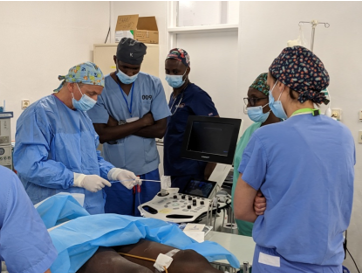
- Perfusion Education
- Throughout the week of surgeries our dedicated CR-OP perfusionist team took significant time out of their days demonstrating safety concerns and proper standards of practice for the discipline of Cardiac Surgery Perfusion. During the surgical procedures, the position of Lead Perfusionist was handed off to the one participating Rwandan perfusionist who completed the procedure under the supervision of our perfusion team supporting them.
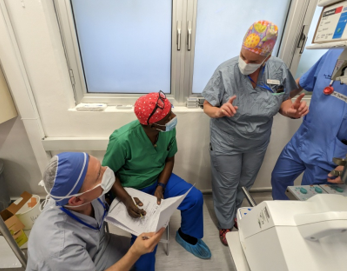
Cardiac OR nursing Education/training sessions:
For the most part the Cardiac OR Nurses had a pretty good handle on what was expected of them. However, the learning doesn’t stop just because you have a good foundation. There are always subtle practices that can be encouraged to improve the standards of practice.
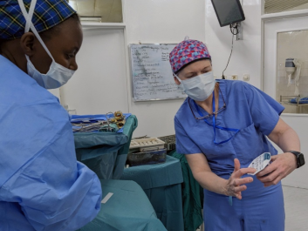
Post-Op Care Education/training sessions:
Post-Op care education was mostly practical education/training at the bedside. The Rwandan team was improving although not yet ready for independence. With this in mind our team of Nurses and Intensivists took every opportunity at the bedside to educate the Rwandan team on best standards of practice. This was supported by multiple formal presentations on this discipline. Along with the nursing aspect, there certainly were opportunities for our Respiratory Therapist to review patient ventilation practices with multiple disciplines within the Post-Op Care program as well.
Topics included but not limited to the following:
- Art line management, removal, drawing blood and ABG’s, removal
- PA catheters: management, checking for placement, zeroing, Cardiac numbers, CVP on PA catheter, how to draw mixed venous gases.
- Chest tube management, stripping every hour post op, checking for leakage
- Pacing: inserting ground needle, different modes, dressings, teaching based on PowerPoint.
- Mobilization: importance of mobilization and DB&C post op, use of heart pillow post op.
- Code management: Defibrillation & Cardioverting different lethal rhythms. Meds used in code situation.
- Teaching on inotropes and vasopressors used in this patient population.
- Prioritizing based on what is most important in the current situation.
- Medication dosing, conversion, and administration (not using ARTLINE for meds)
- Best practices for patient ventilation
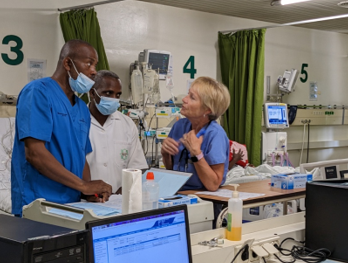
Didactic education/training sessions:
Presentation 1: Basic Outline of a Start-up Cardiac Surgery Program, presented by Dr. Keir Stewart, attendees were Surgeons, Administration and Administration Support Staff.
Presentation 2: Pulmonary Vasodilators, presented by Dr. Romuald Lango, attendees were Surgeons, Lead Healthcare Staff, OR Nurses, ICU nurses.
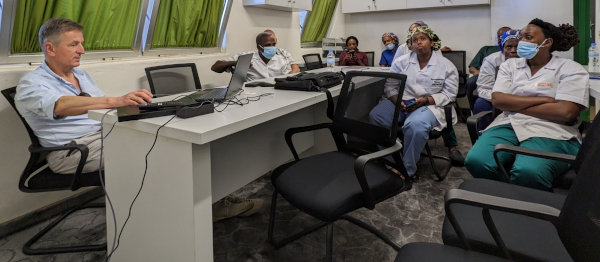
Presentation 3: Pathophysiology of Aortic stenosis and Mitral Stenosis, presented by Dr. Wojtek Karolak, attendees were Lead Healthcare Staff, OR Nurses, ICU nurses
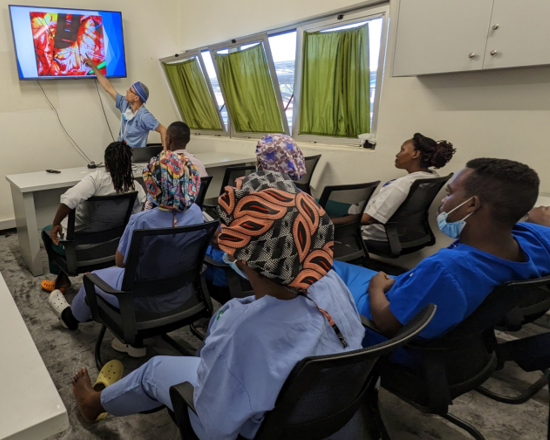
Presentation 4: AVR, MVR, CABG post-op care, presented by Dr. Dominique De Waard.
- Presentation to nurses on Postoperative Course Following Cardiac Surgery.
- Resident informal teaching:
- ICU rounds approach (system-based approach with plan created after full handover and review of blood work)
- Chest tube management
- Epicardial pacing wire management
- Skin closure in the operating room
Presentation 5: Mechanical ventilation/Extubation and basic oxygen therapy, presented by Jill O’ Brien.
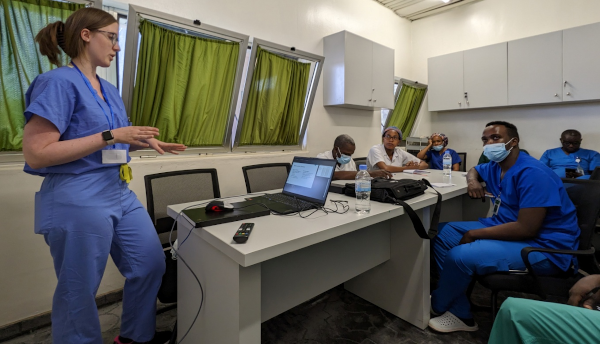
Presentation 6: Cardiopulmonary Bypass, presented by Alison Holt.
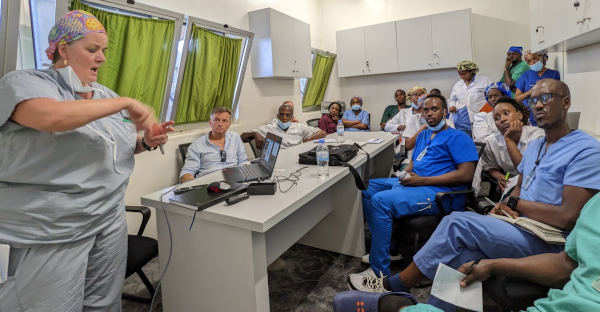
Presentation 7: Inotropic Medication, presented by Dr. Monika Rosinski.
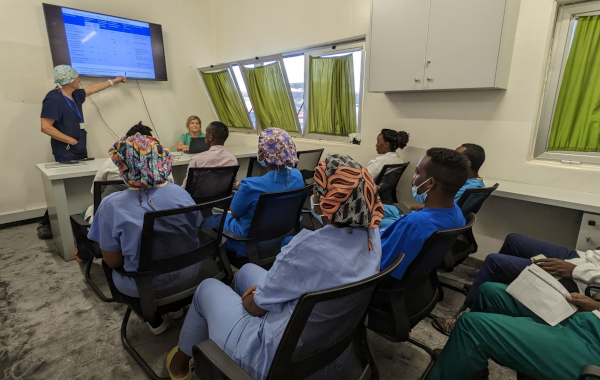
Mission Outcome:
Seven patients had open-heart surgery, with excellent results. All aspects of patient care had different levels of active input from Rwandan professionals, including pre-op assessments by Dr. Ahma in conjunction with Dr. Adam Clark. All operations were led by Dr. Karolak and most procedures were assisted by Dr. Yayu.
On top of the 7 Open Heart Surgery procedures, Dr. Adam Clarke and Dr. Amha performed 4 pacemaker procedures as well.
Anesthesia, as well as the Post-Op care, was led by our 3 Polish contingents of the CR-OP mission team.
Perfusion had one Rwandan actively involved.
Cardiac OR nursing was handled mostly by the Rwandan OR Nurses.
Post-Op care was a blended Rwandan and CR-OP nurse effort.
Challenges: All missions strive to maintain the proper balance between patient safety, and practical education. I believe we achieved this balance.
Conclusions: The May 2023 mission was a great success, with 7 successful open heart operations and 4 pacemaker operations, a week of didactic and practical education/training on all aspects of cardiac surgery, and a tremendously enjoyable experience for both Canadian and Rwandan participants. We are very encouraged with and thankful for a successful mission, now our 3rd such mission. This is yet another small but significant step towards an autonomous Rwandan cardiac surgical program.
On behalf of ACCES, we extend our heartfelt gratitude to Brendon and the dedicated CR-OP team for their invaluable contribution to this remarkable cause. Your unwavering dedication and support have made a profound difference in the mission to enhance cardiac care. Thank you, Brendon and the CR-OP team.
 Atlantic Canada Clinical Engineering Society
Atlantic Canada Clinical Engineering Society